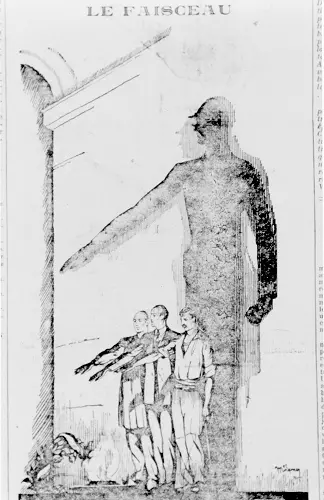Avant-Garde Fascism
The Mobilization of Myth, Art, and Culture in France, 1909–1939
Format:Hardback
Publisher:Duke University Press
Published:3rd Sep '07
Currently unavailable, and unfortunately no date known when it will be back

A study of the development of fascist aesthetics in France, highlighting the influence of the theories of Georges Sorel and his followers
An investigation of the central role that theories of the visual arts and creativity played in the development of fascism in France between 1909 and 1939.Investigating the central role that theories of the visual arts and creativity played in the development of fascism in France, Mark Antliff examines the aesthetic dimension of fascist myth-making within the history of the avant-garde. Between 1909 and 1939, a surprising array of modernists were implicated in this project, including such well-known figures as the symbolist painter Maurice Denis, the architects Le Corbusier and Auguste Perret, the sculptors Charles Despiau and Aristide Maillol, the “New Vision” photographer Germaine Krull, and the fauve Maurice Vlaminck.
Antliff considers three French fascists: Georges Valois, Philippe Lamour, and Thierry Maulnier, demonstrating how they appropriated the avant-garde aesthetics of cubism, futurism, surrealism, and the so-called Retour à l’Ordre (“Return to Order”), and, in one instance, even defined the “dynamism” of fascist ideology in terms of Soviet filmmaker Sergei Eisenstein’s theory of montage. For these fascists, modern art was the mythic harbinger of a regenerative revolution that would overthrow existing governmental institutions, inaugurate an anticapitalist new order, and awaken the creative and artistic potential of the fascist “new man.”
In formulating the nexus of fascist ideology, aesthetics, and violence, Valois, Lamour, and Maulnier drew primarily on the writings of the French political theorist Georges Sorel, whose concept of revolutionary myth proved central to fascist theories of cultural and national regeneration in France. Antliff analyzes the impact of Sorel’s theory of myth on Valois, Lamour, and Maulnier. Valois created the first fascist movement in France; Lamour, a follower of Valois, established the short-lived Parti Fasciste Révolutionnaire in 1928 before founding two fascist-oriented journals; Maulnier forged a theory of fascism under the auspices of the journals Combat and Insurgé.
“If there is an avant-garde within the historiography of modern European culture, then Mark Antliff is one of its luminaries. This remarkable book contributes in a scholarly and exciting way to the history of ideas, art, visual culture, and politics, while enriching comparative studies in both modernism and generic fascism. The complex and ideologically sophisticated fascist milieu of inter-war France has finally been released from the prison of intellectual history: French fascism’s distinctive personality is revealed as a nexus of visionary artistic, social, and cultural schemes to regenerate the nation’s productive dynamism in a way that would heal the degeneracy of the age and place the nation at the cutting edge of modernity.”—Roger Griffin, author of Modernism and Fascism: The Sense of a Beginning under Mussolini and Hitler
“This outstanding study adds an important dimension to our understanding of French fascism. Mark Antliff deftly identifies a variety of ways in which fascists in France and elsewhere activated myths of the past to propel challenging yet seductive visions of achievable futures. This approach is not only crucial to a better grasp of the real causes of fascism’s success in the early twentieth century; it also implies a similar alertness to the threats—and the appeal—posed by the fundamentalisms that seek power in apparently democratic societies today.”—Terry Smith, editor of In Visible Touch: Modernism and Masculinity
“The book is superb on cultural politics and the various fascist discourses on art and culture in the interwar period. . . . Avant-Garde Fascism is an important and accomplished work, and it is definitely required reading for anyone interested in either fascism or modern art.” -- Ihor Junyk * Journal of Modern History *
ISBN: 9780822340157
Dimensions: unknown
Weight: 676g
376 pages